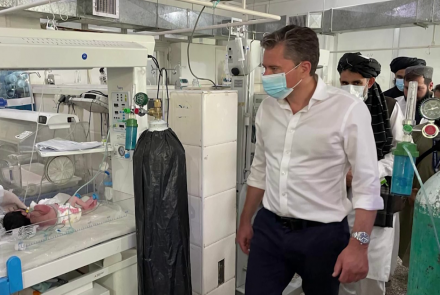Tom Fletcher, the United Nations Under Secretary-General for Humanitarian Affairs, warned about the severe consequences of health budget cuts during his visit to Kandahar.
He stated that the closure of hundreds of health centers has deprived millions of people of essential services and put immense pressure on the remaining hospitals.
Fletcher said: “We often talk about funding cuts in general terms, in terms of numbers and statistics, but I challenge anyone making these decisions to come and visit a hospital like this one in Kandahar, where in the region around us we’ve had to cut in the last few months 400 medical centres denying primary healthcare to over 3 million people.”
According to Fletcher, the reduction in aid has led many health workers, especially women, to face salary cuts of 50 to 60 percent.
Sayed Abdullah Ahmadi, an Afghan physician also emphasized the importance of system-building and regulation in the health sector, stating: “Even with foreign aid, without a structured system and legislation, healthcare services will fail. The Ministry of Public Health must empower domestic specialists skilled in system development.”
Meanwhile, the Ministry of Public Health assured that healthcare services in the country remain stable.
Sharafat Zaman Amarkhil, the spokesman for the Ministry of Public Health, said: “The central health system is still functioning, and there has been no disruption to essential services. We are working on alternative solutions for the supportive services that were previously provided by international organizations.”
The World Health Organization had earlier warned that by June this year, 80 percent of health centers supported by the organization in Afghanistan would be closed. Save the Children also confirmed the closure of 18 of its supported health facilities.

